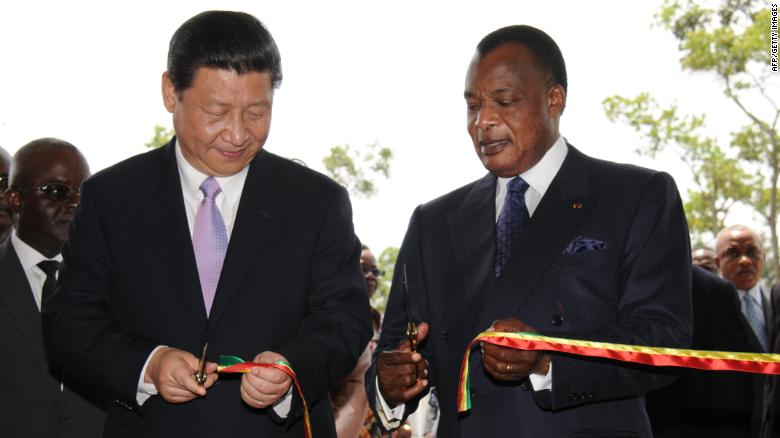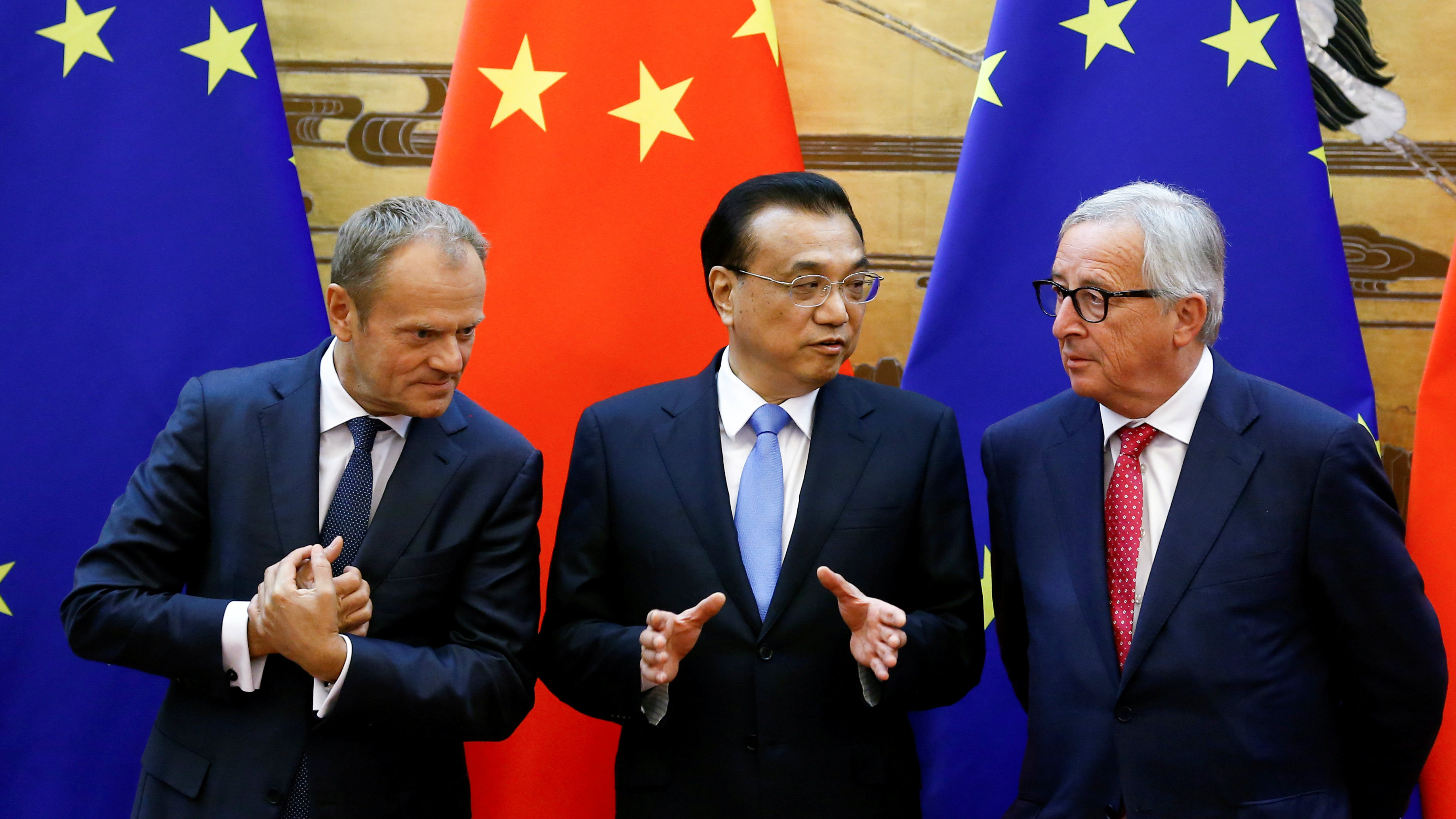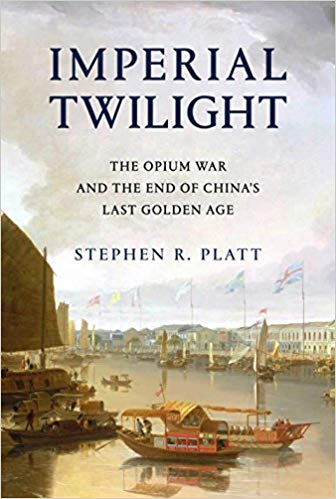
 Xi Charms the World
Xi Charms the WorldAfter a recent successful stream of deals between China and countries within the Middle East and Europe, President Xi Jinping led China's further forays on the international stage with visits around the world this week. In his first foreign visit since his re-election by China's parliament in March, President Xi arrived in the United Arab Emirates on Thursday, welcomed by signs in Arabic and Chinese. Xi spent three days touring the Gulf state, noting that the two nations' "bonds of cooperation are growing stronger." In recent years, China has provided financial support to the UAE as it seeks to expand its infrastructure and industrial zones.
The Chinese leader then traveled to the African continent, making stops in Senegal, Rwanda, South Africa, and Mauritius. This was not Xi's first trip to Africa, following a tradition of recent Chinese leaders who made trips regularly during their time in power to emphasize the priority China places on the continent. In addition to serving as a major trading partner (Africa's largest bilateral trade relationship is with China), African nations also serve as a substantial pro-China bloc at the United Nations, a source of critical raw materials and an important part of the Belt and Road Initiative.
Xi's itinerary reflects China's global repositioning; some experts believe that as the United States retreats into its "America First" mindset, China seeks to step into the limelight as a leader of the international system. Particularly in Africa, China's expansive projects in a number of sectors take advantage of the lack of attention paid to the continent by others, mainly the U.S. As China-US Focus contributor Ian C. Forsyth argued, China's increased diplomatic, economic, and military investments in these regions help to "establish itself as the conductor of this orchestra. This helps to propel China into a greater role as a global leader."
 New Friendships Bloom at EU-China Summit
New Friendships Bloom at EU-China SummitMeeting this week in Beijing for the 20th EU-China summit, leaders from China and the EU presented a united front against unilateralism, in a potential reference to the United States' recent trade policy. In a joint communique, which did not explicitly mention the U.S., both parties stressed their commitment to multilateralism and free trade. "Both sides firmly supported the rules-based, transparent, non-discriminatory, open and inclusive multilateral trading system with the WTO as its core," the communique reads. Unlike the previous two summits — when European and Chinese leaders failed to agree on a joint statement — this summit was marked by signs of increased cooperation between the two superpowers, despite their disagreements in recent years over Chinese investment in the EU, Chinese trade practices, and human rights.
Meanwhile, a new report released this week indicates that China is investing nine times more into Europe than it is into North America. In the first half of 2018, there was a 92% drop in Chinese foreign direct investment (FDI) into North America, while investments have grown significantly in Europe. As we noted last week, Chinese Premier Li Keqiang recently met with German Chancellor Angela Merkel in Berlin, where the two signed business agreements with a total value of over $20 billion.
Writing before the EU-China summit, China-US Focus contributor Nicola Casarini argued that the summit would be "one of their most important meetings in years. . .the two sides do not want to concede to Trump's unilateral moves and will seek to fashion a common position against Washington." One indicator that ongoing trade disputes between China and the U.S. may be putting pressure on the Chinese government is the fact that Chinese mainland stocks are down almost 30 percent since their peak in January.
Kerry Brown, writing for China-US Focus this week, argued that the U.S.' trade war with China could be an opportunity for the EU. "For veterans of EU-China summits over the last decade or so, the outcomes of the most recent, in mid-July in Beijing, were startling," he wrote. "[The EU] is confronted with a situation in which China, as never before, needs it, and is willing to accord it some, perhaps many, of the things it has been asking for years. For once, it is China coming as a supplicant, not the EU."
 China 2020 Air Pollution Action Plan
China 2020 Air Pollution Action PlanChina is the world's leading emitter of greenhouse gases, with the United States not far behind in second place. For years, the environmental relationship between the two countries was a one-way street, with President Obama pushing China to curb their carbon emissions in order to alleviate the effects of climate change. However, recent evidence suggests that these roles may be reversing as President Trump retreats from America's responsibility to lead on the issue of climate change, and Chinese President Xi Jinping demonstrates a new motivation to highlight the issue as a national priority with the recent announcement of the second, "Three Year Action Plan for Winning the Blue Sky War."
With an enormous population, soaring economic growth, and globe-spanning infrastructure projects, China consumes as much coal as the rest of the world combined and has serious problems with air pollution and smog. This is something that the second Three Year Action Plan addresses: representing a continuation and adjustment of the original Three Year Action Plan announced in 2013, the new plan aims to target specific localities and economic sectors with specially designed methods to reduce carbon emissions. These methods vary broadly from the shuttering of coal-fired power plants to bans on the small-scale burning of coal for heat to new investments in energy-efficient infrastructure.
One such investment came this week in the form of a new partnership between the Chinese government and an American startup to bring Elon Musk's futuristic hyperloop transportation system to the mountainous province of Guizhou. Although still in its trial period, the project represents a significant investment for the American company and a serious commitment to modernizing China's transportation infrastructure to reduce carbon emissions. Focus Recommends
Focus Recommends"Focus Recommends" highlights influential new book releases that the editorial team of China-US Focus recommends. In this week's post, we feature Imperial Twilight: The Opium War and the End of China's Last Golden Age by Stephen R. Platt.
Platt's new book explores the history of the fateful Opium War of 1839, crafting a narrative of the preceding half-century to explain "how the Opium War came to be," and the many decisions that built up to eventual conflict. Platt is particularly concerned with the characters of the story — from drug smugglers to politicians in both China and Britain, ultimately challenging common perceptions that the Opium War was the unavoidable result of circumstance or a grand imperial scheme. Imperial Twilight's commentary on the intersection between trade and politics remains relevant today, as China seeks to end "the century of humiliation" and as modern economic aggression appears to be driving a wedge between East and West once again. Read the full review here.
For more of our recommended reading, see Focus Recommends.
Prepared by China-US Focus editorial teams in Hong Kong and New York, this weekly newsletter offers you snap shots of latest trends and developments emerging from China every week, while adding a dose of historical perspective.
- 2018-07-13 China Defends WTO Record in the Face of Additional U.S. Tariffs
- 2018-07-06 The Trade War Begins
- 2018-06-29 President Trump Chooses Slightly Softer Option on Chinese Investment
- 2018-06-22 Trade Tensions Spark Stock Sell-Off in China
- 2018-06-14 How “Comprehensive” Is the Kim-Trump Agreement?
- 2018-06-08 China Awards Putin First Medal of Friendship
- 2018-06-01 USPACOM Rebranded As U.S. Indo-Pacific Command
- 2018-05-25 Trump Cancels North Korea Meeting
- 2018-05-18 The On/Off Trump-Kim Summit
- 2018-05-11 American Goods Are Stuck at Chinese Ports
- 2018-05-04 China and the U.S. Lay Trade Demands on the Table
- 2018-04-27 U.S. Delegation Will Visit China Next Week
- 2018-04-20 China and the U.S. Seek Allies in Trade Dispute
- 2018-04-13 President Xi Reviews the PLA Navy
- 2018-04-06 China and Russia Pledge Military Cooperation in a Signal to the United States
- 2018-03-30 Kim Jong Un Visits Beijing on First Overseas Visit
- 2018-03-23 President Trump Asks for Tariffs on Around $50 Billion Worth of Chinese Imports
- 2018-03-16 Tillerson to be Replaced by Mike Pompeo as Secretary of State
- 2018-03-09 President Trump Agrees to Meet Kim Jong-Un
- 2018-03-02 U.S. Imposes Tariffs on Chinese Aluminum